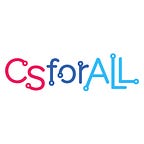How Accessible is Computer Science in Rural Communities?
CSforALL’s member, imagiLabs, interviewed a high school student about their rural upbringing and how that altered their computer science education
Picture living in Eureka, Nevada, a population of almost 500, versus living in New York City, a population of almost 8.5 million. Or consider the streets of central London versus the pastoral villages of Northern Ireland. Aside from the heavily publicized examples of barriers within STEM careers, such as a lack of successful women role models and educational programs for marginalized groups, lies the infamous gap between rural and urban accessibility. It is a factor that is often not talked about at all.
Outside of access to education and career development opportunities, Katy-Rose Hyde — a high school student in England and imagiGirl (coder and tech ambassador) — shares how her rural upbringing in the UK has impacted every aspect of her life.
“The most noticeable difference for me is that there isn’t all that much to do nearby in a small town. This means making different plans to go out with friends is difficult and limited to a few coffee shops or McDonalds. Outside of STEM and school, I am a massive theater kid, and one thing that I do miss about the bigger cities is the access to the theater which we don’t have here.”
While the example of socialization may seem fairly trivial, it speaks to how pervasive the influence of a rural lifestyle can have on one’s day-to-day life. Kids in the country are often restricted by fewer opportunities to explore extracurricular activities, such as theater and sports, as well as lacking more topical interests programs like computer programming and technology. With most state-funded programs to raise awareness about these types of careers and interests focused on more populated cities, those who live non-urban lives have an extra barrier in being exposed to status-quo-breaking ambitions and lifestyles. This is especially true of some young girls who, by virtue of their geographic location and socioeconomic status, are often not prioritized for the likes of coding camps and tech events.
Katy explains that her parents’ occupations in technology and medicine were the foundations of her interest in STEM. She further points out the important influence of her schooling, especially being offered computer science classes. Despite this though, Katy’s experience in the UK education system left a lot to be desired. She notes that in her physics class of 24 students, she is just 1 of 3 girls. This lack of representation occurs in more than just this current course; it can be seen in other “science, maths or computing classes” in her community.
Katy explains that the lack of diversity seen in the classroom is reflective of a lack of uptake in STEM courses — “if people don’t see others like them succeeding, then they may feel discouraged or as if they are less likely to achieve their goals”.
It is evident that schools all over the world need to do a better job in promoting technology to young girls and women as this is the foundation for developing interest in careers in technology in the future. Considering Katy’s case, not everyone has relevant role models who can inspire them to learn programming languages; nor does everyone in ‘countrysides’ have access to coding camps and events for #womeninSTEM (let alone consistent internet connection!).
This is why progressive EdTech companies that cater to diverse audiences, like imagiLabs, are vital. imagiLabs provides accessibility to those who traditionally are underrepresented within the industry. Our team has created the first social network for girls interested in coding, where tweens can learn Python through self-expression in a friendly community. We offer free apps, curriculum, and hardware which make programming truly engaging.
“I definitely think that using imagiLabs to create digital artwork is something truly amazing. I am all for creative expression and I think being able to do that in an intelligent way is really rewarding too.”
Katy herself has found imagiLabs’ app to be tremendously useful in fitting programming into her “busy schedule.” As an imagiGirl, she is able to stay connected to a global community of like-minded techie teens. Organizations, companies, and governments need to do more to reach and include learners like Katy! Join CS For All and imagiLabs in their missions to improve access to computer science education.
About imagiLabs: imagiLabs is a Stockholm-based startup devoted to diversifying tech, founded by three women. They have built hardware, apps, a digital community, and creative coding curriculum to support millions of pre-teen and teen girls, empowering them to use technology to shape the future!
About the Author: Sulaiman Hussain is a Business Development Intern at imagiLabs. Hussain is getting his BS at New York University in Psychology with Economics.
Quotes provided by Katy-Rose Hyde a high school student in England and imagiGirl (coder and tech ambassador).
